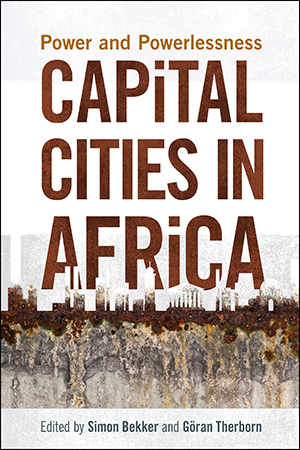
- 2012/220 pages
- Distributed for HSRC Press
Includes color photos
Capital Cities in Africa:
Power and Powerlessness
Paperback: $32.00
ISBN: 978-0-7969-2350-9
Capital cities today remain central to both nations and states. They host centers of political power, not only national, but in some cases regional and global as well, thus offering major avenues to success, wealth and privilege. For these reasons capitals simultaneously become centers of 'counter-power,' locations of high-stakes struggles between the government and the opposition.
This volume focuses on capital cities in nine sub-Saharan African countries, and traces how the power vested in them has evolved through different colonial backgrounds, radically different kinds of regimes after independence, waves of popular protest, explosive population growth and in most cases stunted economic development. Starting at the point of national political emancipation, each case study explores the complicated processes of nation-state building through its manifestation in the 'urban geology' of the city its architecture, iconography, layout and political use of urban space. Although the evolution of each of these cities is different, they share a critical demographic feature: an extraordinarily rapid process of urbanization that is more politically than economically driven. Overwhelmed by the inevitable challenges resulting from this urban sprawl, the governments seated in most of these capital cities are in effect both powerful wielding power over their populace and powerless, lacking power to implement their plans and to provide for their inhabitants.
In its concentration on urban forms of multi-layered power, symbolic as well as material, Capital Cities in Africa cuts a new path in the rich field of studies related to African cities and politics. It will be of interest to scholars in a wide range of disciplines, from political history, to sociology, to geography, architecture and urban planning.
This volume focuses on capital cities in nine sub-Saharan African countries, and traces how the power vested in them has evolved through different colonial backgrounds, radically different kinds of regimes after independence, waves of popular protest, explosive population growth and in most cases stunted economic development. Starting at the point of national political emancipation, each case study explores the complicated processes of nation-state building through its manifestation in the 'urban geology' of the city its architecture, iconography, layout and political use of urban space. Although the evolution of each of these cities is different, they share a critical demographic feature: an extraordinarily rapid process of urbanization that is more politically than economically driven. Overwhelmed by the inevitable challenges resulting from this urban sprawl, the governments seated in most of these capital cities are in effect both powerful wielding power over their populace and powerless, lacking power to implement their plans and to provide for their inhabitants.
In its concentration on urban forms of multi-layered power, symbolic as well as material, Capital Cities in Africa cuts a new path in the rich field of studies related to African cities and politics. It will be of interest to scholars in a wide range of disciplines, from political history, to sociology, to geography, architecture and urban planning.







